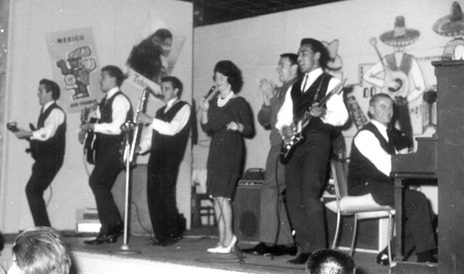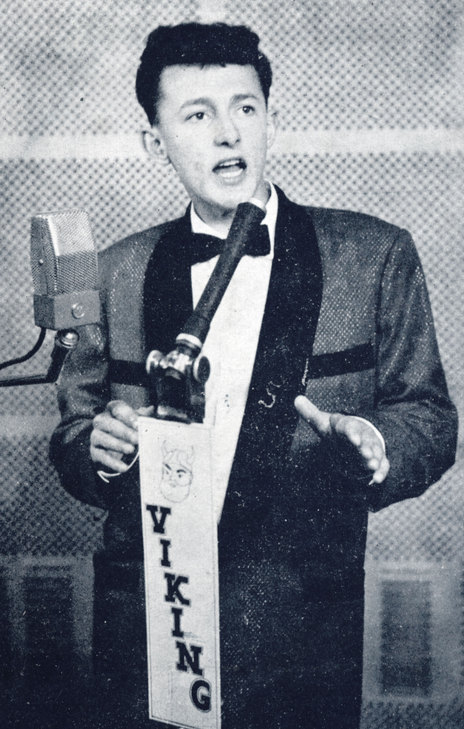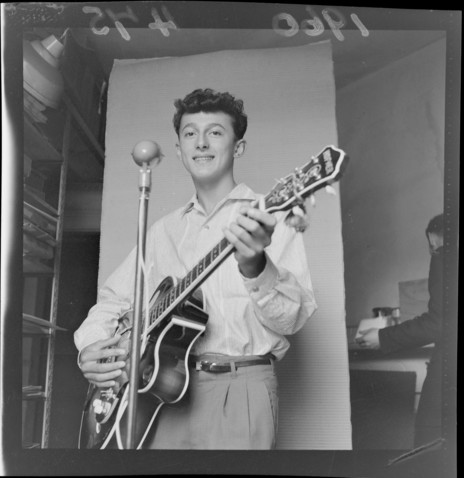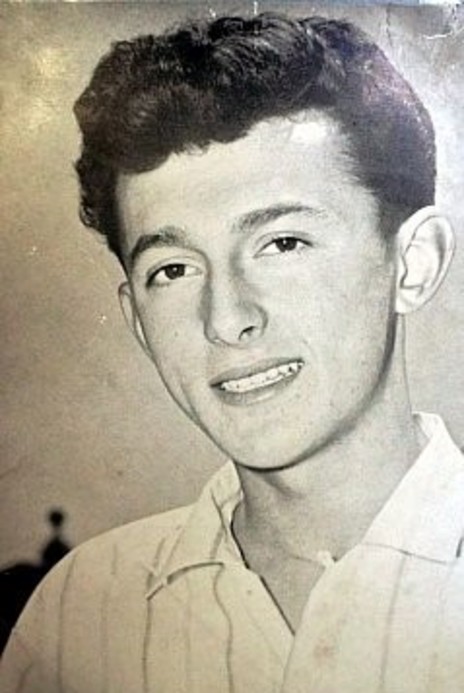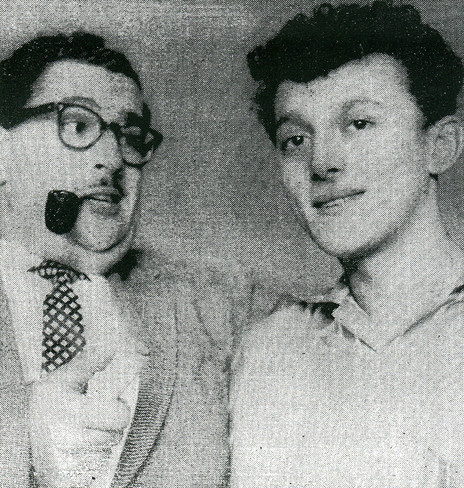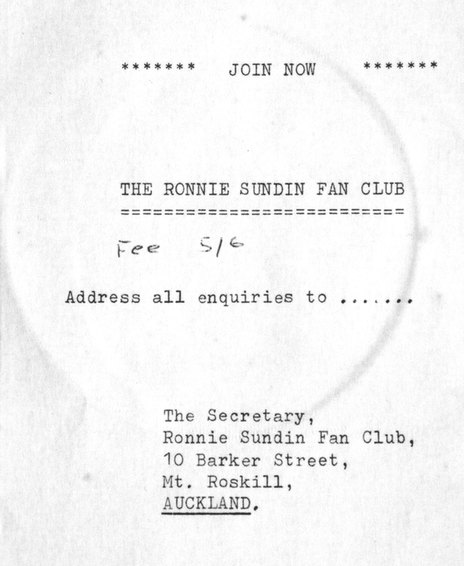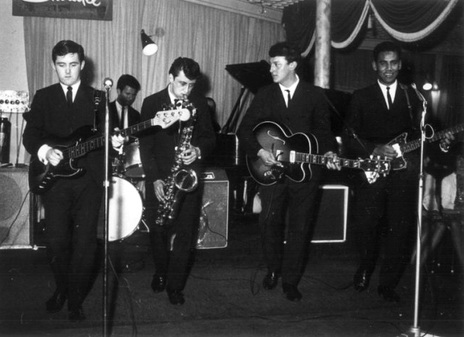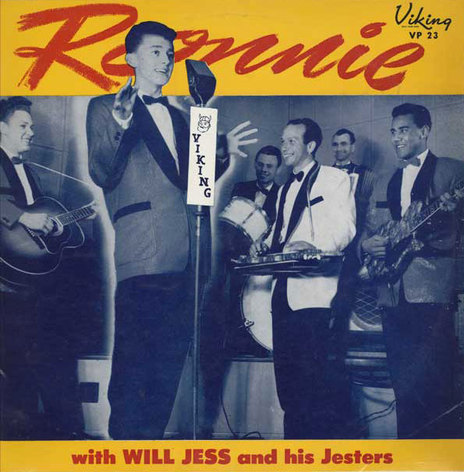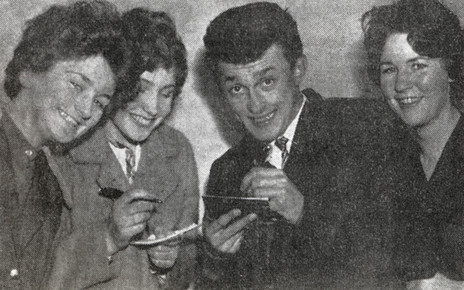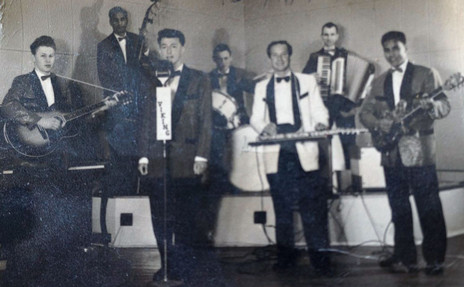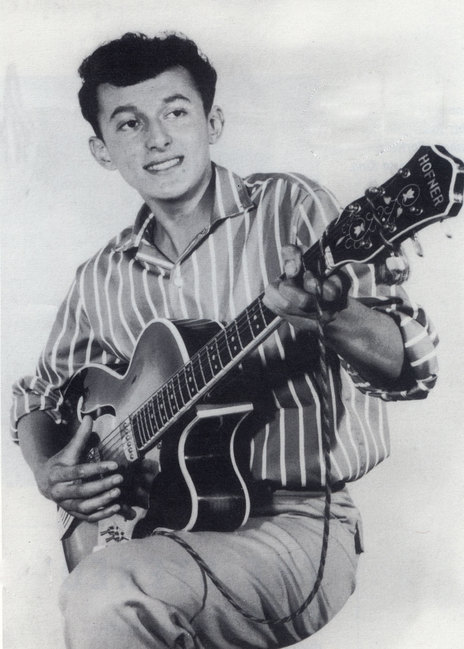“We were practising in Mum’s lounge one day. Bill Sevesi used to listen to us, and we played at the Orange Hall in his breaks. We won Have A Shot twice on ZB. Bill asked Dad if he could borrow Ronnie for a Town Hall concert because the English singer he’d had, Vince Callaher, had gone back to Britain. Dad said he could have Ronnie as long as he sang ‘Waltzing Matilda’. Dad was a true-blue Aussie. He reckoned he could see Australia if he went to the right beach in Auckland.”
Sundin was still at Avondale Technical College and about to sit School Certificate when Viking Records released his debut single in September 1959. In the USA, the original version of ‘Sea of Love’ had yet to reach No.1 in the R&B charts when Sundin recorded it, with ‘Waltzing Matilda’ on the B-side.
Providing the backing was Will Jess and the Jesters, ie. Bill Sevesi and his band. This local version was soon played on radio’s Lever Hit Parade and quickly became a local phenomenon. Both sides were popular, and the disc sold 15,000 copies in four months. Viking had a teen star on its hands.
Within weeks of leaving school, Sundin was a fulltime musician, topping the bill at the Auckland Town Hall. Cinema magazine – a predecessor of Playdate – reviewed the concert: “Looking like a young, slim Robert Mitchum onstage, and displaying a sensitive personality that keyed well with his winning voice, Sundin kept the excitement simmering. He sang everything with catching sincerity, making ‘Mr Blue’ sound as though it had been written for him.”
Several other Viking artists were also on the bill, which was aimed at an older crowd. Drag act Noel McKay played it relatively straight, performing “his celebrated sophisticated numbers” in a men’s suit, while the striking chanteuse Hiria Moffatt sang ‘That Old Black Magic’. The teenagers probably enjoyed the rock and roll band the Satellites, but what their parents thought of exotic nightclub entertainer “Levita” performing “a sinuous Cuban dance” – while wearing a bikini with a feather duster attached to her bum – we can only speculate.
to avoid being over-run by fans, he took refuge under a parked van.
On 24 January 1960, Sundin appeared in front of 20,000 teenagers at Western Springs; they paid 2/6 for a variety show topped by the Howard Morrison Quartet. Also on the bill were The Keil Isles, Vince Callaher, Kahu Pineaha, Noel McKay and Merv Thomas and His Dixielanders. According to Cinema, Sundin had the bobbysoxers swooning to his “high-octane delivery of such swinging items as ‘Waltzing Matilda’.” Afterwards, to avoid being over-run by fans, he took refuge under a parked van.
However, a signing session in Wellington went awry when Sundin and his manager were accosted by fans, as the Evening Post newspaper reported:
“They were confronted by the largest crowd of teenagers they had yet struck. They managed to get to, and scramble into, their car but were unable to start off through the crowd. Finally, in desperation, Ronnie climbed onto the top of the car with his guitar and started to sing. He hoped they would disperse after a song and leave him to go in peace, but no such luck. For 20 minutes he had to sing to, and with, a mob of wild teenagers, bringing the traffic on Lambton Quay to a standstill.
“It finally ended when traffic policemen, accompanied by four constables, pushed their way through the crowd to the besieged vehicle with the rock star on the roof playing his guitar, and asked if he had a permit to perform in a public thoroughfare.”
One of Sundin’s admirers was a very young Graham Lowe, who would go on to coach New Zealand’s national rugby league team. He recounted to Gifford how he loved hanging out at the Sundin household as five-year-old:
“They were really kind to me, especially Ronnie. He taught me chords on a ukulele. Queen Salote of Tonga was related to their mum and used to visit them. One day she called me over to her and showed me how to do a five-finger strum … Everybody loved Ronnie and so did I. At one stage he drove around in a brand-new Hillman Minx. Written all down the side was ‘Here Comes Ronnie’. We felt so proud because he used to take us for a drive around the block.”
Throughout 1960 Viking seized the moment, flooding the market with releases by Sundin – six singles, an EP called Heartbeat, and an album, Ronnie with Will Jess and His Jesters. Most of the album was a compilation of the earlier singles, a mix of light, rock and roll, and blues (‘Mean Woman Blues’, ‘Moo Cow Boogie’, ‘Bye Bye Baby Goodbye'), pop and standards. ‘Teenage Beat’ was written by Sevesi; not on the album was Sundin’s duet with Daphne Walker, ‘Best Wishes’.
The cover versions were safe bets for the record company, but Sundin was dubious. Playdate wrote: “Imitations never get an artist anywhere, Sundin believes. He likes to give his own interpretation to a song and looks forward to putting on record some of the originals of Gene O’Leary, a local songwriter.” Sundin told the magazine: “Pop ballads are what I like doing best, and I suppose Bobby Darin is my favourite. I know it’s just about out in America now but” (with a flash of defiance) “I like rock and roll!”
Born in December 1943, Sundin began at the age of 12, learning a few ukulele chords from his mother, then forming a skiffle band called the Barnyarders. He was later discovered by Sevesi, who lived across the road, and heard the band rehearsing for eight hours one Sunday. In January 1960, Sevesi said in Joy newspaper, “I decided that his voice was too good to be abused like that.” According to the Evening Post, Sevesi chided him for not giving his voice enough rest. “It’s only just coming right,” Sundin replied, and Sevesi recruited the band to perform that night at a charity talent quest. Soon he hired Sundin to be a permanent soloist with the Jesters, and gave him voice and stage training.
In a 1992 interview with Gordon Spittle, Viking boss Murdoch Riley described Sundin’s music as “soft rock and roll, not heavy. The fact that we put Will Jess behind him rather than a solid rock band gives you an idea. With his soft voice, he had to have a soft backing. He had a Pat Boone sound, but certain numbers suited him very well.”
After his first recording sessions, Sevesi said he was often asked by well-wishers whether Ronnie would get a swelled head like so many other artists. “My answer to that is a definite No. I have known Ronnie as a toddler, and his two elder brothers. They are all unspoilt and show great respect for their parents.
“When Ronnie first joined my band, his father said, ‘Ronnie is yours, and all I ask is, remember his age, and his sleep, and I’ll not interfere.’ So now when Ronnie looks drowsy, I say 'Go to bed,’ and off he goes, no fuss no bother.”
Viking decided to pull out the promotional stops, taking him around radio stations and organising a promotional tour of the North Island, giving in-store appearances and playing cinemas. “It was a bit scary,” said Riley. “He couldn’t survive it. He was being mobbed – he was a good-looking kid – and it was my first experience of the mob, the love of the mob. We were doing both shows and store appearances and you would bring him out … we were not used to having to control the crowds and we got a much better response than we expected – masses of teenagers.”
ON TOUR, SUNDIN’S HANDLERS STRUGGLED TO GET HIM IN AND OUT OF THE CAR. TEENAGERS WOULD JOSTLE HIM.
Sundin’s handlers struggled to get him in and out of the car. The teenagers would jostle him, and inside the stores, knock the fixtures over. “They were not thieving things, they were just boisterous and hard to handle. We did not realise that emotions could play such a part, and that was the teenager of that time. It was all very innocent – okay they wanted to get hold of him and get his clothes off him, but only for a souvenir sort of thing.”
Shortly after this tour, Sundin spent three weeks in hospital, suffering from peritonitis; while there, he received 300 get-well cards.
Big things were predicted for Sundin, including a spot on a Lee Gordon package show in Australia, where ‘Waltzing Matilda’ was “tipped to sell out”. However, the star himself was disintegrating. Alex Patchett was the lead guitarist in Sevesi’s band and related to Phil Gifford how the young Sundin went astray:
“It was so sad. He was very shy, very likeable, and very eager to learn. He was very raw, and he went from school straight into a totally different world. We spent hours and hours rehearsing in Bill Sevesi’s garage, where Bill had a home studio. We spent a huge amount of time working through things with Ronnie, preparing him for professional recording. He was very young but he had a really pleasant voice, which was the type of voice that was in vogue at the time, ideal for ballads. He had youthful good looks, too.
“But he took to drink, which made him unreliable. He also had lots of hangers-on, who encouraged him. He was an extremely generous person and I think he was taken advantage of by lots of people. He was drinking a lot and the hangers-on influenced his thinking. He just drifted away really. It was very sad. Sometimes he would come in and he’d be blind drunk.”
There were no releases after 1960, and after performing as part of the Al Paget Sextet in 1962-1964, Sundin slipped from the limelight. Even Sundin’s son Mark lost track of him over the decades that followed, but they reconnected in the 2000s. Mark explained to Phil Gifford that Sundin tried harder as a grandfather than he ever had as a father:
“Like clockwork, a present would turn up a few days before every birthday. There was almost always a soft animal toy that sang, everything from a really ugly pig dog that sang ‘Who Let The Dogs Out?’ to a Rastafarian lion that sang ‘Don't Worry, Be Happy’. The kids loved them and their childhood was soundtracked by a succession of really awful-sounding animals … He once saw a photo of my daughter Kiri in a little junior dance costume. His face went ashen. He said, ‘You’re not going to let her be famous, are you? Whatever you do, the kids can’t be famous.’ ”
Ronnie Sundin died peacefully on 9 May 2021.
--
With thanks to Phil Gifford
